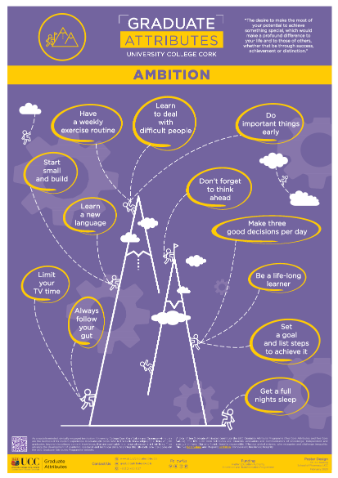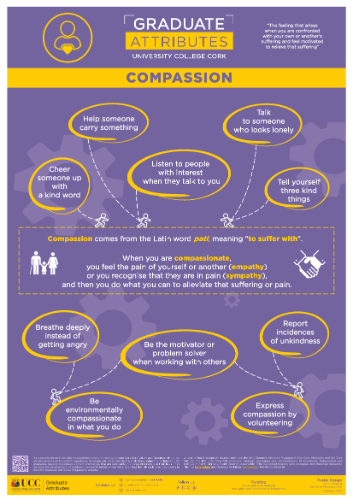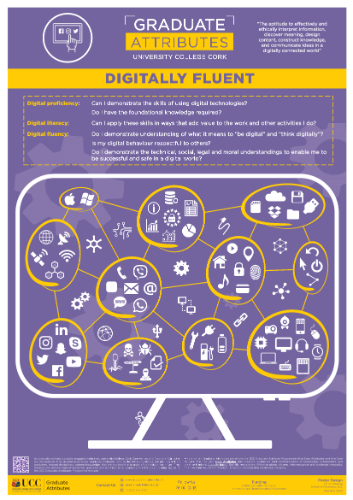In This Section
- What is the Graduate Attributes Programme
- Nurturing Bright Futures
- Your Compass
- GAP Podcast
- Students: Supporting your transitions to develop attributes and values
- Staff: Working together to deliver our Graduate Attributes Programme
- Case Study BA (Hons) Economics through Transformational Learning
- Case Study M.Plan
- Case Study OT1004
- Case Study BA (Hons) Film and Screen Media
- Case Study NU4025 Health Informatics for Nurses and Midwives
- Case Study Irish Legal Information Initiative (IRLII)
- Case Study Made2Move Programme
- Case Study MA Arts Management and Creative Producing
- Case Study - GAP and Pharmacy
- Embedding Graduate Attributes
- Employers: How UCC is preparing students to transition out into professional environments
- About Us
- Events to Support Your Transition Through UCC
- Events to Support Your Transition Out of UCC
- News
- What we are working on
- Proud Ally
- Committee and Meeting Training
Graduate Attributes - Focused Resources for Students, Staff and other Stakeholders of the School of Pharmacy.
Name: Dr. J.J. Keating, Bronagh Bolger, Trang Thanh Bui
Contact: 021-4901692
Email: jj.keating@ucc.ie
Programme: Pharmacy (BPharm / MPharm)

Abstract
We have developed a series of Graduate Attribute (GA) - focused resources for students, staff and other stakeholders of the School of Pharmacy. The primary aim of these supports is to heighten local awareness of the GAs amongst pharmacy students, to demonstrate the School’s commitment to the GA project and to illustrate to students how their BPharm and MPharm curricula provides opportunities to gain competence in each GA.
These developed materials currently comprise of a set of infographic posters and more detailed support documents to complement the poster series. Two posters and one document have, to date, been developed for each of the ten Graduate Attributes. While one of the posters developed for each GA describes the Attribute in a generic, discipline independent manner, the second poster of the Attribute is pharmacy specific, and illustrates many of the ways that an undergraduate pharmacy student can gain competence in the GA by engaging with activities, learning experiences, placements and other elements of the BPharm / MPharm curricula. The supportive documents provide more detailed analysis and descriptions of how curricula activities mentioned in posters are associated with the GA under review.
Posters are designed to be displayed in hard copy around the Pharmacy Building for staff, students and others to engage with, and can also be available electronically, in addition to the supportive documents.
The generic GA posters developed as part of this work may also be of interest to other UCC Schools and Departments. In addition, the pharmacy specific resources developed may provide inspiration to other groups in UCC to create their own GA resources to suit their needs and disciplines.
Most of the posters and supportive documents described above have been created by pharmacy students, for not only their fellow students, but also for staff and other stakeholders such as the Pharmaceutical Society of Ireland (PSI), the Irish Pharmacy Regulator.
Outcomes of this School of Pharmacy initiative are intended to be used synergistically with resources and programmes of UCC’s Graduate Attributes Programme.
The work described herein describes the outcomes and experiences to date of the School of Pharmacy.

In what context does this initiative/practice take place?
There were several reasons why the School of Pharmacy chose to map its pharmacy curriculum to UCC’s Graduate Attributes at this time.
The School’s BPharm and MPharm curricula are aligned and have been extensively mapped to the Pharmaceutical Society of Ireland (PSI) Core Competency Framework (CCF) for Pharmacists. The CCF comprises a series of Domains, Competencies and Behaviours which a pharmacist should be competent in to practice in their roles and duties as pharmacists. The School is obliged by the PSI, its accreditation body, to provide students with an extensive array of curricular opportunities to become competent and proficient, in a gradual and progressive manner, in all of the PSIs CCF Behaviours.
UCC’s Graduate Attributes are somewhat similar to the PSIs CCF in that they are both a set of life qualities and skills that pharmacy graduates should exhibit and put competently into practice in the context of pharmacy but also in other activities in their lives.
With the School’s existing extensive experience in mapping its curriculum to a set of criteria, extending that mapping to the GAs seemed to be a worthy exercise to complement the already established CCF mapping that pharmacy undergraduates and staff are already very familiar with.
With UCC Schools and Departments likely to be asked in the future to explicitly illustrate how their disciplinary teaching and programmes aligns to the university Attributes, we decided to be proactive in this matter and explore the development our own method and resources for this mapping exercise.

What was the rationale for introducing this initiative/practice/project?
When the Graduate Attributes programme was unveiled to the university in the latter half of 2019, the School took a proactive approach in considering how the programme could be tailored, made visible locally, and to immerse its undergraduate pharmacy students in this initiative. Mapping the GAs to the pharmacy curriculum was also considered prudent for several reasons, including an opportunity to identify gaps in the BPharm / MPharm curriculum which may inadequate address one or more of the GAs. In addition, we wished to describe and highlight to students, staff, the PSI and Graduate Attributes Programme Office of the many ways that the current pharmacy programme already affords students experiences and activities mappable to one or more of the GAs. We considered attaining competency of each Attribute to be akin to achieving a set of overarching learning outcomes which were supernumerary but complementary to pharmacy module, year and programme learning outcomes.
Between September and December 2019, the Graduate Attributes Office emailed UCC staff on a weekly basis to gradually introduce to the college community each of the ten GA. Each email typically included an infographic, sourced online or created locally within UCC, describing some aspect of the Graduate Attribute. These infographics offered a visually appealing background to elements or aspirations of the Attribute in question. While the infographics had no connection to each other from a design perspective, they did set the seed for the Pharmacy School to consider the creation of a series of GA-focused infographic-style posters with common design features aligned to publication designs of the office of the Graduate Attributes Programme.
Structure
During the first half of 2020, an initial set of ten A0-size portrait-orientated infographic-styled posters (one poster per Attribute) was developed by Dr. J.J. Keating of the Pharmacy School using PowerPoint® as the primary software platform. These posters focused on describing the traits of each GA in a generic manner, independent of a UCC programme or discipline, and which would be of adequate generality to be displayed anywhere throughout the university. Their chosen design elements (colour scheme, typeface, symbols, etc) align to the livery and componentry of the graphical style features adopted and used within Graduate Attributes Office publications. This ensured a common design and branding for all developed posters and an alignment to the corporate branding of the Graduate Attributes Programme unit. Poster components include a blend and considered balance of text, icons, and other graphical symbols to in order to appeal to their target audiences.
Following the development of this initial poster set, an opportunity arose to recruit two BPharm4 undergraduate pharmacy students for a 4-month period between September and December 2020 to aid in the development of a further set of ten pharmacy-specific posters whose overall design matched those of the original set of ten generic GA posters. Two very abled pharmacy students, Bronagh Bolger and Trang Thanh Bui, were chosen as placement students for the project. The students first created an electronic database of BPharm and MPharm curricular activities, starting with individual modules in first year, and considered how these activities were associated with one or more Graduate Attributes. The students also consulted with fellow students, their preceptor, and staff members in the creation of their initial information database. As the BPharm students involved in this project were in their fourth year, they partly relied on their own personal experiences of their undergraduate pharmacy journey to bring their own perspectives to the GA curriculum mapping process. However, they needed to consult with others to gain adequate insight into aspects of Semester II of BPharm4 and the MPharm year which they had yet to personally undertake as part of their own pharmacy studies. Once their database was built, Bronagh and Trang then set about designing a set of unique but complementary posters with similar design features as the generic poster set created earlier in 2020. We were conscious not to overburden each poster with information, and reserved some of the detail and mappings to the supportive documents that both students wrote as an additional resource to each pharmacy-specific GA poster they developed.
Both posters associated with each GA are intended to be viewed as a pair, with the generic poster setting the scene of the Graduate Attribute and its half twin illustrating that Attribute further in the context of the BPharm / MPharm programmes.
The third set of resources developed for each Graduate Attribute are ten text-based support documents, providing more detailed descriptions of how curricular activities and experiences outlined in the pharmacy specific poster provides opportunity to pharmacy students to gain competence in the Attribute under consideration. In addition, the support documents provide a summary statement of a description of the GA from a pharmacy perspective, the rationale, inspiration and design features of each pharmacy-specific poster, additional curricular activities which align to the Attribute under consideration but do not feature in the poster due to space constraints, and a bibliography of published articles and web resources further linking that Attribute to the discipline of pharmacy. These supportive documents were primarily written by the BPharm4 students who co-created the pharmacy-specific poster set.
In summary, a total of 20 posters and 10 supportive documents have been created to date, covering all 10 Graduate Attributes from both a discipline independent and pharmacy perspective.
Are there any unique elements?
A particularly strong element of the project was the extensive input by undergraduate pharmacy students in the development of the pharmacy-specific posters and support documents, as described above.
As part of their BPharm and MPharm studies, pharmacy students are required to undertake a series of placements, dispersed through the five years of their undergraduate and MPharm programmes. One of these placement blocks is positioned within Semester I of the BPharm4 year, and may be undertaken in a wide variety of settings, including a community or hospital pharmacy, and in role emerging pharmacy practice settings, such as the pharmaceutical industry, in a regulatory setting, and in academia. Fourth year placement students work alongside a pharmacist preceptor, whose responsibility it is to provide feedback, guidance and mentorship for student(s) under their supervision.
Having students create GA-relevant resources for the School of Pharmacy seemed to be an appropriate and worthwhile initiative to offer BPharm4 students as a role-emerging non-patient facing placement opportunity. The project would require students who were knowledgeable of the pharmacy programme, had a creative mind, and, for its timing, were prepared to undertake the project remotely while being in regular contact with their preceptor. Due to the extensive knowledge that undergraduate students inherently possess of the curriculum they are undertaking, the challenges that the COVID-19 pandemic raised to undertake some placements in a face-to-face setting, and the length of the placement, this pharmacy GA project seemed to be an ideal opportunity for the students to undertake as their BPharm4 placement. While it is usual for preceptors to mentor one BPharm4 student in a placement setting, it was considered appropriate to recruit two students for this placement. Both students provided mutual support throughout the duration of the placement and project work. In addition, they were able to exploit their complementary knowledge and experiences of the pharmacy curriculum. Finally, they were able to pool their creativity for the development of the set of pharmacy-specific posters that would attract the attention and facilitate the engagement of their fellow students.
Throughout the development of the posters and support documents, we were in regular contact with the Graduate Attributes Programme unit in terms of sharing our ideas, and future plans and for the unit to provide us with constructive advice and resources.
How has this initiative/project/practice helped the development of 'graduate attributes' in your students?
Please see UCC Graduate Attributes on this link: https://www.ucc.ie/en/registrar/theconnecteduniversity/academicstrategy/attributes/
The local roll out of the project outputs to pharmacy students have been significantly curtailed at the moment due to the current restrictions of access to campus and other constraints that remote teaching and learning have imposed upon us.
Our plans however include the printing of hard copies of the developed posters for display around the Pharmacy Building in order create awareness amongst students of how the university Attributes are of direct relevance to them as pharmacy students, their current curricular activities and to their future careers post UCC. We will also work with PharmSoc, UCC’s Pharmacy Society, to highlight the resource pack to its members. Electronic access to the posters and support documents will also be provided to students and staff, but the platform on which this will be hosted as yet to be decided. We are currently exploring methods to embed or explicitly link he tools in various forms to curricular activities.
While the posters have been designed to be printed in hard copy and displayed in public spaces of the Pharmacy Building, their content is of adequate resolution and to allow them to be printed and laminated to A4 size, affording a durable, mobile and hard copy format to facilitate sharing between students and for reference purposes during in-class activities.
We do not consider the posters and support documents already developed as the end of the Pharmacy School’s local GA project. We plan to record a collection of experiences of undergraduate students who have undertaken pharmacy placements in the past of how they have put into practice one or more Attributes to solve a problem or face a challenge while on their placement, and to subsequently develop a written resource to share these scenarios with other pharmacy students. Similarly, we propose to interview recent past graduates of the UCC BPharm and MPharm programmes to determine how they are putting UCC’s Graduate Attributes into practice in the real world, both from a pharmacy perspective and in a more general way as citizens, and to also share these examples with undergraduate pharmacy students as part of a larger toolbox of pharmacy-specific Graduate Attributes resources.
How are you going to make Graduate Attributes development explicit in the expression of the Curriculum and Learning Outcomes?
While the posters and explanatory documents so far developed have provided where and how the GAs occur and can be engaged with within the BPharm and MPharm curricula, we have yet to make them or the GAs themselves explicit in Curriculum and Learning Outcomes. This is a piece of work that the School has yet to tackle and to discuss how it will approach doing this.
However, the work that has already been produced in this project in identifying how, where and why the GAs are of relevance to an undergraduate pharmacy students learning will make its formal embedding in curriculum and learning outcomes more straightforward to carry out in the near future.
Graduate Attributes Programme
Contact us
5, Brighton Villas, (First Floor) Western Road, University College Cork, T12 EC95
